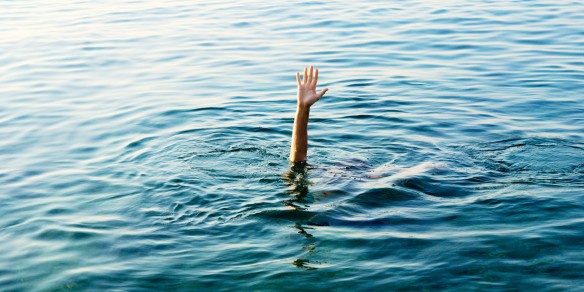Pelagianism
Grace is optional. Man is inherently capable of obeying God. As the first man, Adam typified the choice that every human makes to obey or disobey God. His “original sin” was simply the first sin, and sets a bad example for the rest of humanity, but did not change the subsequent nature of mankind or destroy man’s ability to obey. As the “second Adam,” Jesus sets a good example of a man who consistently obeyed God. Jesus’ death on the cross is not necessary for man’s redemption, but represents the ultimate act of selflessness to inspire man to endure suffering and sacrifice his own desires.
Analogy: A man is swimming in the ocean. He can make the decision to swim to safety, where God stands on the shore calling, or he can ignore God and stay out in the water where he will eventually drown.
Semi-pelagianism
Grace is necessary, in part. Man is inherently capable of hearing God’s voice and choosing to obey, but his ability to actually obey has been damaged (the result of inheriting a corrupted nature from Adam). In response to man’s decision to obey, God extends his grace to enable man to obey.
Analogy: A man is close to drowning in the ocean. If he tries to swim to shore, he will in fact drown. He sees and hears God on the shore, and he calls out to God for help. In response, God provides a life jacket so that the man may safely swim to shore.
Arminianism
Grace is necessary, but not sufficient. As a result of Adam’s sin, man now has a sin nature that is so thoroughly corrupted that he has lost all ability to please God. However, God in his grace, has extended prevenient grace to all men, effectively counteracting total depravity, leaving man still depraved (totally depraved, in and of himself), but now with the undeserved (and foreign to his own nature) ability to respond to God’s gift of salvation. Man can choose to accept God’s grace, receive a new nature, and rely on God’s grace for salvation, or he can choose to reject God’s grace and remain in (or, at a later date, return to) his depraved condition.
Analogy: A man is drowning in the ocean, and has lost consciousness. God awakens the man, places him on a lifeboat and begins pulling the man to shore. As long as the man does not intentionally get off the lifeboat, he will be saved.
Calvinism (aka Augustinianism)
Grace is necessary and sufficient. As a result of Adam’s sin, man now has a sin nature that is so thoroughly corrupted that he has lost all ability to please God. The only way for man to respond positively to God is for God to replace the dead heart of stone with a new nature, a nature that is inherited from Jesus instead of Adam. As a result of God’s regeneration, those whom God has elected will freely respond in obedience to God.
Analogy: A man has drowned in the ocean. God sends Jesus to breathe new life into the man and carry him to shore.
